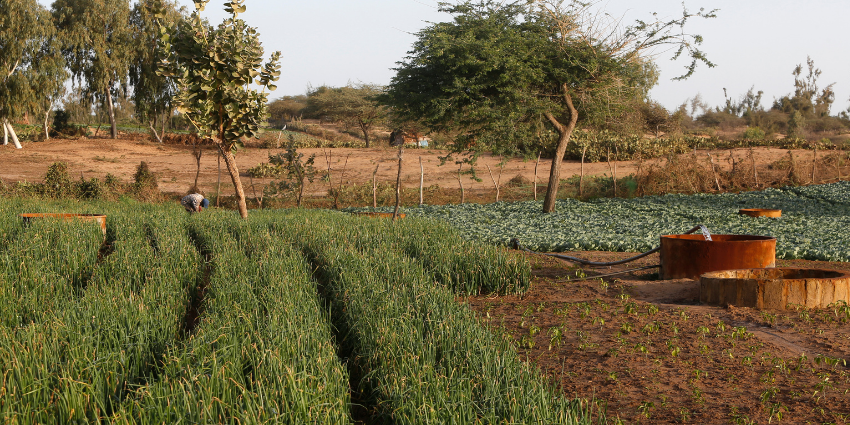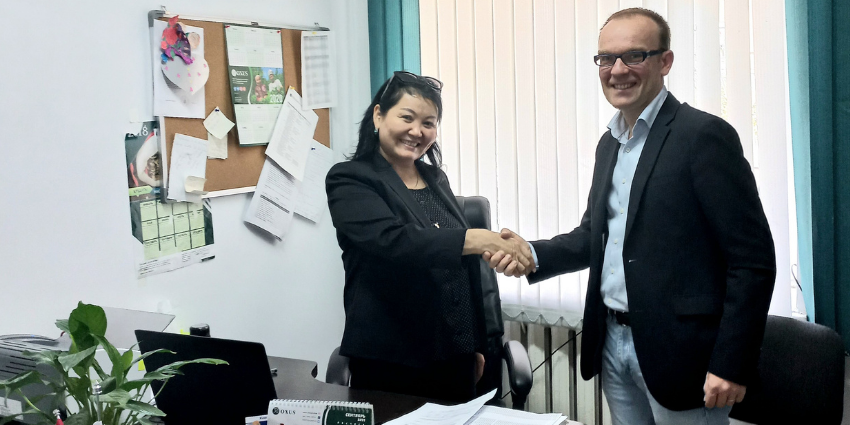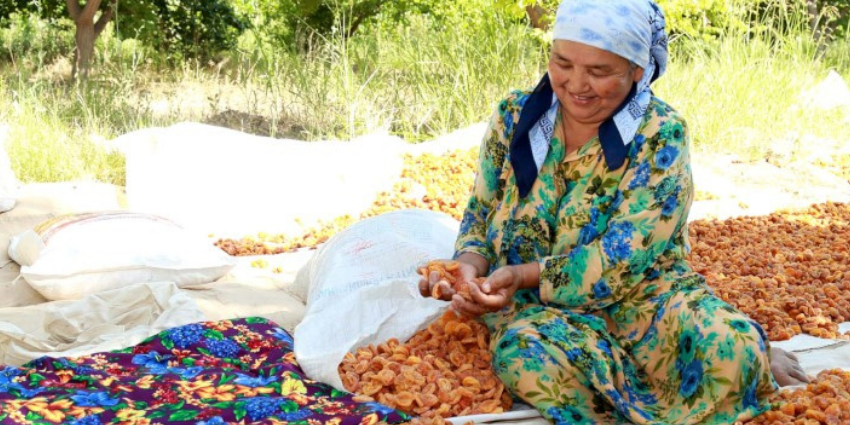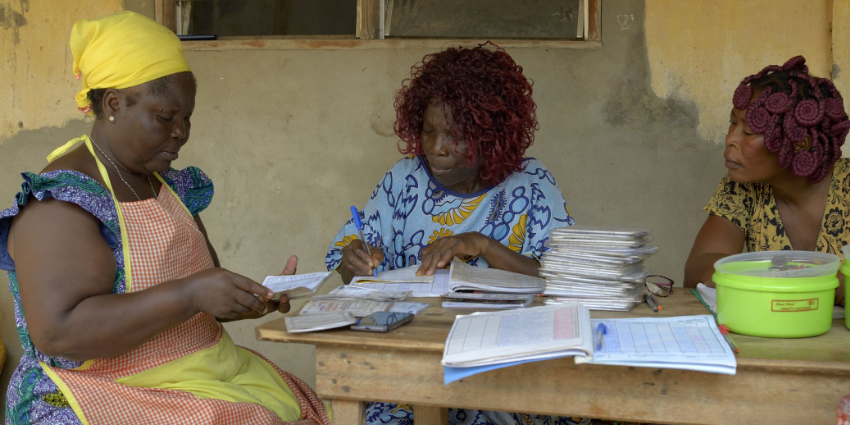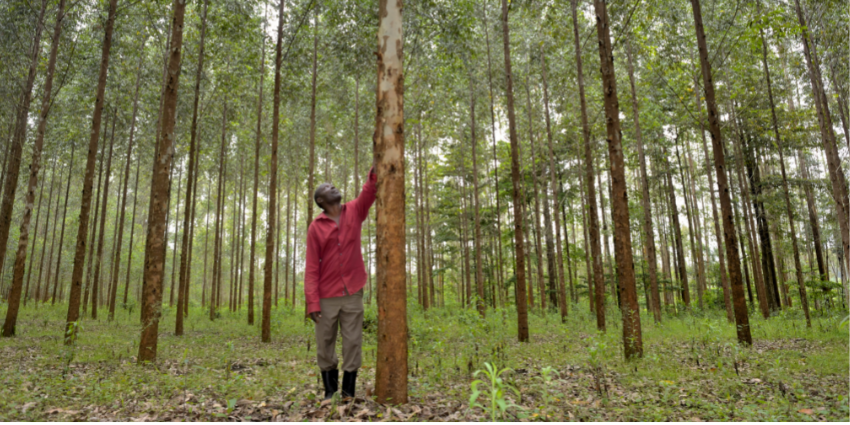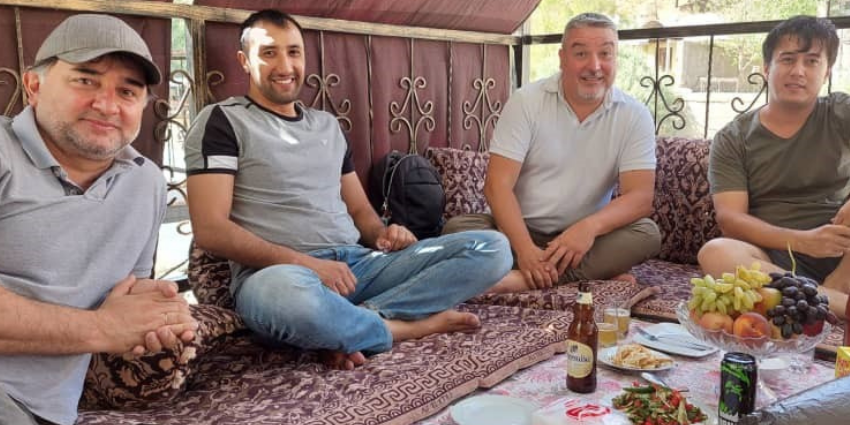
Solidarity Banker – OXUS Tajikistan ©Olivier Mancini
Launched by the Grameen Crédit Agricole Foundation and Crédit Agricole SA in 2018, Solidarity Bankers is a skills-based volunteer program open to all Crédit Agricole Group employees, supporting microfinance institutions and impact businesses supported by the Foundation. Olivier Mancini, Solidarity Banker at Crédit Agricole Languedoc, completed a field mission in September 2021 for Oxus Tajikistan (OTJ).
Column by Olivier Mancini, Head of Recovery, Crédit Agricole du Languedoc
Motivation that can withstand anything
I discovered the Solidarity Bankers program through a call for applications launched by the Grameen Crédit Agricole Foundation at the end of 2019 on the website creditagricole.info. The proposed mission, in support of Oxus, a microfinance institution in Tajikistan, caught my attention and prompted me to make initial contact.
After an enriching experience in Zimbabwe in 2018 as part of a solidarity leave scheme, I was looking to get involved again in skills-based volunteering or training missions with adults, preferably abroad. The immersion in a new context, the discovery of a different culture and the opportunity to practice a foreign language motivated me as much as the desire to share my knowledge.
When the mission for Oxus Tajikistan (OTJ) was launched in early 2020, it didn't take me long to apply! Since the mission's objective coincided with my work, my profile was selected. I then conducted several interviews with the Foundation's teams before being definitively selected. That was without taking into account Covid-19: it was impossible to avoid the mission's postponement. No matter, I had plenty of time to prepare in advance for the mission in the field.
Mission preparation
Founded in 2006 by ACTED and following the adoption of microfinance laws in Tajikistan, OTJ is a microcredit organization that provides loans primarily to microentrepreneurs and farmers in rural areas. A partner of the Grameen Crédit Agricole Foundation since 2012, OTJ aims to improve the economic and social conditions of low-income populations excluded from the traditional banking system.
The objective of the mission was to review the valuation process for the different types of guarantees and to consider the introduction of additional valuation methods in order to get as close as possible to best practices in this area. To achieve this result, the mission had to be well-framed and prepared before departure. I therefore learned the principles of microfinance and studied the institution's internal documentation to familiarize myself with their procedures. I also spoke on numerous occasions with OTJ and the Foundation to better formulate the expectations of the mission.
With the terms of reference finalized and the health situation improving, I only had 5,000 km left to travel and 18 hours of flying to complete the mission!
Heading to Tajikistan
Arriving at 3:00 a.m. in Dushanbe, I was greeted by Bakhtyior and immediately faced the language barrier. I (unfortunately) speak neither Russian nor Tajik, but thanks to a few words of English we managed to communicate on the essentials.
The next morning, I met with Vantasho, Managing Director, and then with the heads of the various departments to gain a good understanding of how the activities were conducted. I was also able to meet with beneficiaries to discuss financing requests and the characteristics of the assets offered as collateral. The documentation and information collected on site, in addition to the documents previously studied, allowed me to develop and submit my recommendations to Vatansho. With his approval, I continued the work I had started with Umedjon, Risk Director, and Shurhat, Financial Director, to establish the foundations of a new collateral valuation methodology and then provide the elements to support this new method to be implemented.
The duration in the field (10 days) proved sufficient to meet the terms of reference of the mission and to develop the necessary materials for the implementation of the recommendations planned for a few weeks after my departure. With this in mind, the mission will continue remotely for a few additional days of support in order to provide additional insights and perspectives on the implementation methods and the evaluation of the relevance of the methodology.
An unforgettable experience
Undoubtedly, this experience exceeded my expectations, both in terms of the mission carried out and on a human level.
Faced, over a short period of time, with the expressed desire to fulfill the mission's objectives in order to provide concrete and appropriate responses, I was able to count on the great availability of all OTJ employees regardless of their function. I was also able to rely on the expression of a mutual critical view in a real spirit of openness on the part of my main contacts. The co-construction of the proposed solutions was all the more gratifying, especially since it was necessary to achieve the same requirement in terms of consistency and solidity of the recommendations as that which I can experience in my activity, but with significantly fewer external facilitating tools. It is therefore a real satisfaction to have been able to contribute to the evolution of the organization's practices with the OTJ teams.
Clearly, and despite the brevity of the stay, the experience on a human level is unforgettable thanks to their sense of hospitality. The (many) moments of conviviality were real opportunities for sharing that allowed me to learn more about the history of Central Asia, Tajikistan and even their personal history. I would leave with great pleasure and I thus keep the precious memory of people who greet with a hand on their heart but who also have their heart on their sleeve.
I would like to thank the people at the Caisse régionale de Crédit Agricole du Languedoc who supported my approach; Caroline Brandt, Carolina Viguet, Cécile Delhomme from the Grameen Crédit Agricole Foundation who made this mission possible; Aurélie Cacciotti from Crédit Agricole SA for logistical support; and of course Vatansho Vatanshoev, CEO of OTJ and Umedjon shodiev, Head of Risks at OTJ, Shurhat Zoidoc (CFO) as well as all the OTJ teams for their help and welcome, with a special greeting to Bakhtyior and Yosuman.
